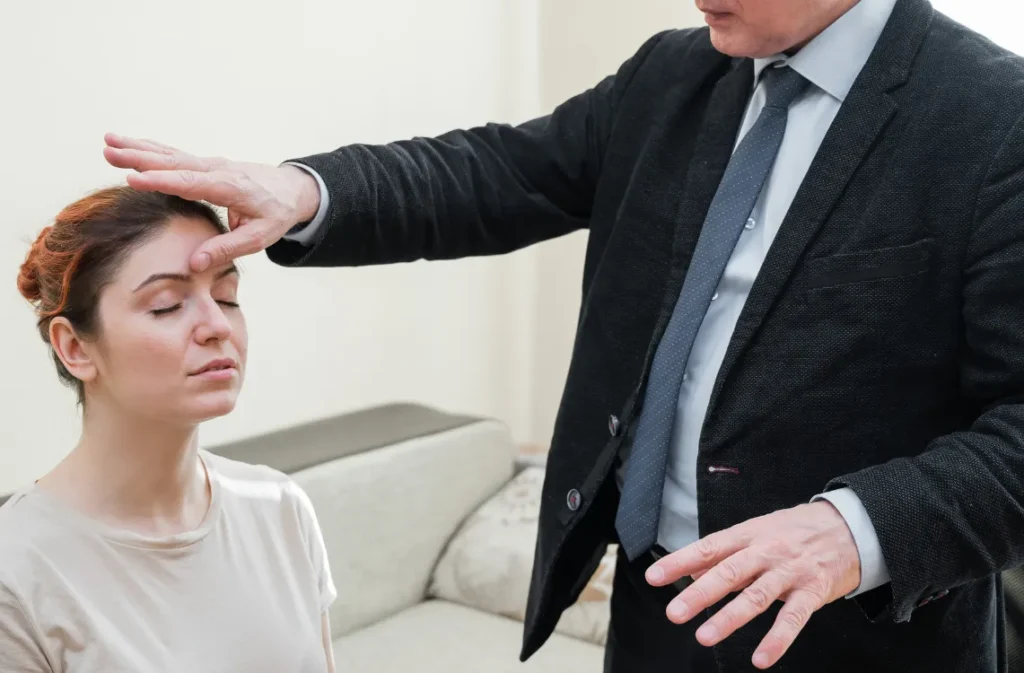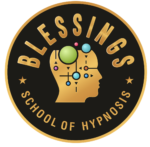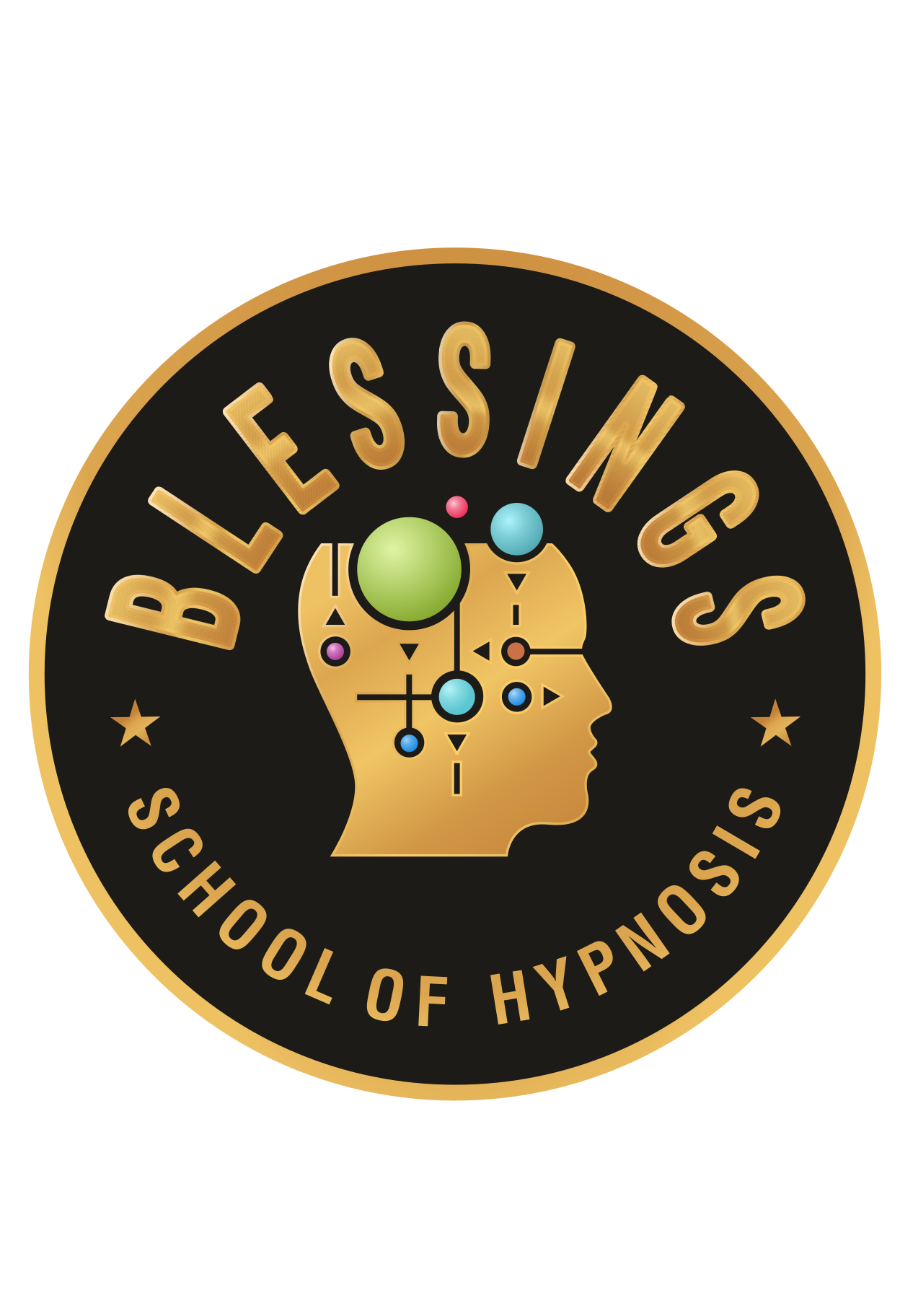Hypnotherapist Course
Transform lives with our Hypnotherapist Course. This course offers expert-led training, a comprehensive curriculum, and hands-on practice to equip you with the skills to become a proficient hypnotherapist.
Blessings School of Hypnosis
Why Choose Our Hypnotherapist Course?
Unlock your potential with our Hypnotherapist Course. Experience expert guidance, comprehensive learning, practical experience, and a supportive community that empowers you to excel in hypnotherapy.

Expert Instructors
Our Hypnotherapist Course is taught by leading practitioners in the field, including Dr. Pradeep Kumar and Tarun Rhode. Their years of experience and extensive knowledge ensure that you receive top-notch training in hypnotherapy.
Comprehensive Curriculum
The Hypnotherapist Course at Blessings School of Hypnosis covers all aspects of hypnotherapy, from fundamental theories and techniques to advanced applications and ethical practice. Our curriculum is designed to provide a thorough understanding of hypnotherapy, ensuring you are well-prepared to practice.
Hands-On Experience
Gain practical experience through supervised sessions in our Hypnotherapist Course. This hands-on approach ensures that you are ready to practice hypnotherapy confidently and competently upon graduation.
Flexible Learning Options
Our Hypnotherapist Course offers both online and in-person classes to accommodate your learning style and schedule, making it accessible to everyone.
Supportive Community
When you enroll in our Hypnotherapist Course, you join a network of peers and professionals who provide support, mentorship, and opportunities for continuous learning and development in the field of hypnotherapy.
Explore Our Hypnosis Courses
Our curriculum welcomes both newcomers and seasoned practitioners to the transformative world of hypnotherapy. The Hypnotherapist Course guides you through a comprehensive journey into the realm of the subconscious, from foundational principles to advanced applications.

Basic Hypnosis
Unlock the fundamentals of hypnosis, from understanding the mind's intricacies to mastering trance states and suggestion techniques. This course covers key topics like the science behind hypnosis, effective communication with the subconscious, rapid induction methods, therapeutic applications, and ethical practices.

Advanced Hypnosis
Elevate your practice with advanced strategies for a deeper scientific understanding, application across various conditions, and professional competency. Focus areas include advanced therapeutic techniques, research evidence for hypnosis in medical and psychological interventions, and applying hypnosis within professional settings.
Course Structure
Semester 1 Courses
Objective :
To give basic knowledge of hypnosis, its history To understand the misconceptions attached to it
To gain knowledge about observable facts of hypnosis
- Meaning of hypnosis and hypnotherapy, definitions, basic concepts in hypnosis, terminology in hypnosis
- General misconceptions, resistance
- The history of
- The history of hypnosis in
- Phenomenon of hypnosis : Ideomotor response, ideosensory activities, Catalepsy, positive hallucinations, negative hallucinations, time distortion.
- Various psychological , physiological and other theories of
- The concept of hypnotic susceptibility and its
- Hypnotizability scales and measurement of hypnotic
- Factors that influence suggestibility, objective and subjective trance
- Hypnosis induction techniques : Direct
- Principles of direct suggestions
- Deepening techniques, measuring depth in
- The process/ steps of hypnotherapy : Preparation of patient for hypnotherapy: Physical and mental, history taking, medical check up, rapport building, clarifications of doubts and misconceptions, suggestibility test, hypnotic induction, deepening of trance, ego strengthening, pleasant imagery, re orientation, review, discussion on session.
- Taking a case history, contradictions
- Communication skills : Attending and
- Creating therapeutic environment : empathy, unconditional love, non – being, judgemental, genuineness
- Adverse reactions and precautions in
Ethical consideration sand professional fees in practice of hypnosis.
Objective :
To make students understand the basic anatomy, physiology, higher functions of brain and their functional relation with each other.
- To gain knowledge in normal functioning of various biological
- To understand common psychopathological
- Basic anatomy of brain: Various parts of brain and their functional relation with each other.
- Physiology of brain functions: Voluntary and autonomic control of body, systems, higher functions of brain like thinking, memory, emotions, speech, sleep, etc.
- Various biological systems (digestion, respiration, circulation, excretion, endocrines, blood, lymph and neuro muscular tissues) and their common abnormalities.
- Physiology of pain sensation and associated emotion of
- Psychobiology of genes and its relevance to
- Information substances: molecules of emotions and
- Definition of abnormal psychology, causes of
- Theory of personality: Freud, Adler,
- Common psychopathological
Objective :
To learn script writing
- Applications of hypnosis in sports and athletics
- Applications of hypnosis in self development
Overview of clinical and other applications of hypnosis including scientific studies and their general outcome etc.
- Script writing for
- Induction of trance
- Deepening of trance
- Elicitation of phenomenon of hypnosis
- Script writing for
- Ego strengthening
- Pleasant imagery
- Types of suggestions
- Hypnosis in sports and
- Hypnosis in self-development, self-regulation, self-growth (positive emotions)
- Personality development and character building
- Applications of hypnosis in
- Pain problems (in general)
- Stress management
Objective :
To provide an introduction into the field of psychology and methods of applications. To make a student understand the psychological processes involved in sensation, perception, learning and memory.
To help student understand their own experience and also the social work by application of their knowledge on sensation, perception, learning and memory.
- Introduction and methods of psychology
Definition of psychology, popular notion of the discipline, psychology as a natural and social science.
Methods in psychology : Observation method, experimental method, survey method, psychological test cases, case study method, correlation method.
- Atention and Perception : Nature and definition of attention, kinds of attention, selective and sustained attention
Perception : Organising principles : Figure ground grouping ; perceptual constancies : shape size, size, brightness, factors affecting perception.
- Learning : Definition of Learning, principles of learning : Classical conditioning and operant conditioning, basic processes :
extinction, spontaneous recovery, generalization, discrimination, transfer of training, reinforcement of schedules.
- Emotion and Motivation : Emotion, definition of emotion, theories of emotions, facial feedback hypothesis, three elements of emotions : Physiology, behavioural and subjective
Motivation : Nature and definition : Motivational cycle; frustration of motives and conflict, primary and social motives.
The aim of this module is for students to become sufficiently confident and skilled in the application of hypnosis within their professional work.
Students have 90 hours of practice distributed during the semester. During this paper, students will have a few demonstration sessions on different techniques and process of hypnotherapy. Students are then required to carry out therapeutic practice on minimum five clients/ subjects in the field of their work, outside of classroom. These 90 hours include preparation, practice and report writing. Report on these cases will be considered for internal assessment carrying 50% of total paper credit.
The following content will be covered under clinical practice
- Induction of hypnosis by direct techniques
- Deepening of hypnosis
- Ego strengthening
- Pleasant imagery
- Phenomena of hypnosis
- Suggestibility tests
- Awakening/ Alerting/ Termination of trance
Viva voice will be conducted at the endof the semester I, by a panel of examiners appointed by the head of the department. Viva voice will be based on entire course covered during the semester and will focus on students, grasp of core courses and insights that they have developed in the subject, and application of theory in their profession.
Semester 2 Courses
Objective :
To introduce the hypnosis induction techniques Framing of indirect suggestion
The process of hypnotherapy
- Hypnosis induction techniques : Indirect / Ericksonian techniques. Principles of indirect/Ericksonian hypnotic suggestions, framing of indirect suggestion Waking hypnosis, pediatric hypnosis.
Phenomenon of hypnosis : Analgesia, anesthesia, amnesia, hypermnesia, dissociation, depersonalization, revivification, age regression, agr progression, hyperesthesia, posthypnotic hallucinations, somnambulism, automatic writing.
- The process of hypnotherapy : Problem identification and goal setting, therapeutic scripts Therapeutically utilization of trance-suggestions, visualizations, metaphor Post hypnotic suggestions, self hypnosis.
- Indications of hypnosis in medical, dental and psychological ailments in adults and children, Indications of hypnosis in sports, study, self development and other Transference, counter transference, handling abreactions, issues dealing with pediatric hypnosis.
- Basic ingredients of hypnotherapy. Physical surroundings of hypnotherapy. Structuring the therapeutic situation.
Professional societies and associations related to hypnosis.
Objective :
To understand major psychotherapy
To utilize hypnotic phenomenon and techniques Designing a therapeutic session
- Major psychotherapies : Psychoanalytic (Freudian) therapy REBT, behaviour modification and non directive (roger) approaches.
Psycho- psychological interface : psycho-neuro immunology, psycho- neuro endocrinology.
- Utilizing hypnotic phenomenon for therapeutic intervention. Hypnotherapeutic techniques I : ego management – western and eastern (Ahankar shuddhi) approaches.
Hypnotherapeutic techniques II : Sensory imagery conditioning, Stein’s clinched fist techniques, Chiasson’s techniques etc.
- Hypnotherapeutic technique III : Hypnoalytic approaches viz. Age, Regression, sub conscious exploration, Dream indication etc. Inner child healing, Gestalt approaches, The affect bridge technique
- Designing a therapeutic session, Assessment in Ericksonian hypnotherapy, Progress assessment, follow up and Evaluation, and conclusion
of therapy .
Objective :
To understand hypnosis in various medical specialities Treating terminal illness and psychiatric ailments
- Hypnosis in various specialities of medicine: Internal medicine Including cardiology, pulmonology, endocrinology, neurology etc, General surgery, obstetrics & gynaecology, orthopaedics, Dermatology, sexual medicine, anaesthesiology and others.
- – Hypnosis in treatment of cancer and other terminal
- Hypnosis in burns and other
- Hypnotics in dentistry (Hypnodontics).
- Hypnosis in paediatrics: Habit disorders: Thumb sucking, nail biting, enuresis, stammering, juvenile delinquency.
- – Hypnosis in physiotherapy, obesity, sleep disorders
- Hypnosis in substance
- Forensic (Investigative)
- Hypnosis in psychological and psychiatric ailments: Anxiety, phobia, depression, obsessive compulsive disorder, sexual disorders, somatoform PTSD & borderline and psychotic conditions, child birthing.
The aim of this module is for students to become sufficiently confident and skilled in the application of hypnosis within their professional work.
Students have 90 hours of practice distributed during this semester. During this paper students will have few demonstration sessions on different techniques and process of hypnotherapy. Students are then required to carry out therapeutic practice on minimum 5 subjects in the field of their work, outside of classroom. Report on these cases will be considered for internal assessment carrying 50% of total paper credit.
The following content will be covered under clinical practice.
- Induction of trance by indirect techniques
- Suggestions by metaphor
- Demonstration and practice of different framing suggestions
- Demonstration and practice of techniques:
- Clinch fist
- Cision technique
- Empty chair
- Age regression
- Age progression
- CBT Techniques
- Sensory imagery conditioning
- Behavioural Modification techniques
Objective :
To help the student understand how the effect of people’s thoughts, emotions, motivations, and actions affect their health.
To help students understand, predict, control and ultimately change health related behaviour To help candidates use concepts of positive psychology in promotion of mental health.
- Stress and health: Stress and stressors; general adaption syndrome; Personality and stress; social factors in stress;
Coping mechanisms: problem focused coping; emotion focused coping; defence mechanisms; meditation as coping; cultural and religious factors as coping; cognitive coping styles, casual attributions, sense of control, learned helplessness; hardiness, social resources and social support, emotional disclosure
- Health recommendations and behaviour change: Prevention of health problems; adherence to medical regimens; sources of health information; persuasion; changing beliefs and attitudes; social cognitive theory; self-regulative theories; subjective social norms; what other people think, intentions and commitments; turning commitments into behaviour.
- Psychology of well-being: Subjective well-being happiness; positive emotions and well-being the broaden and build theory of positive emotions
- Positive traits, virtues and character strengths: Positive beliefs, self-esteem, self-regulation, optimism, virtues and strengths of character
Viva voice will be conducted at the end of the semester II, by a panel of examiners appointed by the head of the department. Viva voice will be based on entire course covered during the semester and will focus on students, grasp of core courses and insights that they have developed in the subject, and application of theory in their profession.
This course is ideal for:
Who Should Enroll?
- Mental health professionals looking to add hypnotherapy to their practice through our Hypnotherapist Course.
- Individuals seeking a career change into the field of hypnotherapy.
- Coaches, counselors, and wellness practitioners interested in expanding their skill set with hypnotherapy.
- Anyone fascinated by the power of the mind and eager to learn how to use hypnosis to facilitate change through our Hypnotherapist Course.
- Therapy providers aim to integrate hypnotherapy into their existing services for enhanced client outcomes.

Blessings School of Hypnosis
Certification and Career Opportunities
Upon successful completion of the Hypnotherapist Course, you will receive certification from Blessings School of Hypnosis, recognized by leading hypnotherapy associations. This certification opens doors to various career opportunities, including private practice, collaboration with wellness centers, and roles in mental health settings.
Blessings School of Hypnosis
Take the First Step
Embarking on our hypnotherapy course is more than just an educational endeavor; it’s a journey towards becoming a catalyst for change in other people’s lives. With our expert guidance, comprehensive curriculum, and supportive community, you’re well on your way to becoming a skilled and ethical hypnotherapist.
Contact us today to learn more about the course and how to enroll. Your path to becoming a professional hypnotherapist starts here at Blessings School of Hypnosis.



